Eco-lodges: Sustainable Havens for Nature-Loving Travelers
In the realm of travel, eco-lodges stand out as beacons of sustainability, offering travelers an immersive and eco-conscious experience. These unique accommodations blend seamlessly into their natural surroundings, embracing eco-friendly practices that preserve the environment while enhancing the guest experience.
Introduction to Eco-Lodges
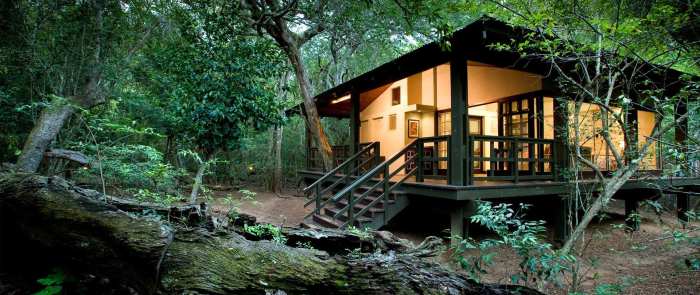
Eco-lodges are accommodations that prioritize sustainable practices, preserving the natural environment while offering a unique and immersive experience for travelers. These lodges are designed to minimize their ecological footprint, promoting responsible tourism and supporting local communities.
The popularity of eco-lodges has surged in recent years, driven by increasing environmental awareness and the desire for authentic travel experiences. Eco-lodges provide an opportunity to connect with nature, learn about conservation efforts, and contribute to local economies.
Eco-lodges offer a sustainable and immersive travel experience, blending comfort with environmental consciousness. To plan your eco-friendly adventure, consider using a travel itinerary template to organize your itinerary and ensure you make the most of your time exploring these unique destinations.
Eco-lodges provide an opportunity to connect with nature, support local communities, and minimize your environmental impact while creating unforgettable memories.
Benefits of Staying in an Eco-Lodge
- Reduced Environmental Impact: Eco-lodges adhere to strict sustainability guidelines, minimizing their carbon footprint and conserving natural resources.
- Support for Local Communities: Eco-lodges often partner with local businesses and employ local staff, supporting economic development and preserving cultural heritage.
- Unique and Immersive Experiences: Eco-lodges offer an opportunity to experience pristine natural environments, participate in conservation activities, and learn about local ecosystems.
- Educational Value: Eco-lodges often provide educational programs and guided tours, fostering environmental awareness and promoting sustainable practices.
Types of Eco-Lodges
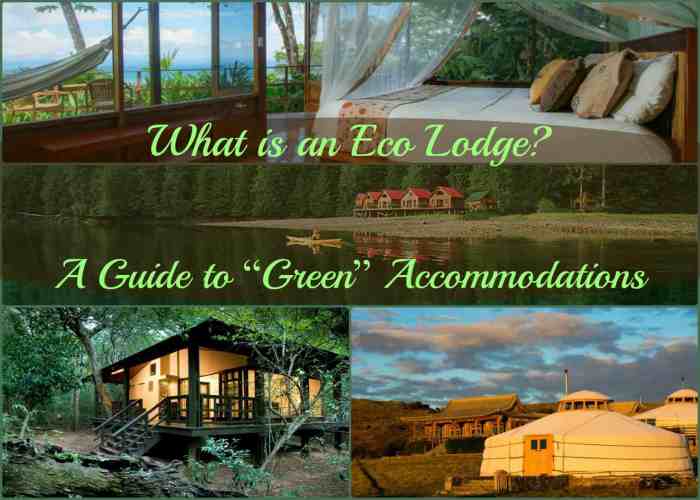
Eco-lodges vary widely in their design, amenities, and target audience. Some cater to adventurous travelers seeking immersion in nature, while others offer a more luxurious experience with modern conveniences.
Eco-lodges, renowned for their sustainable practices and immersive experiences, cater to discerning travelers seeking authentic connections with nature. If you’re planning a luxury getaway, consider exploring luxury travel deals that feature eco-lodges. These exclusive accommodations offer an unparalleled blend of comfort, style, and environmental consciousness, ensuring a memorable and transformative travel experience.
The classification of eco-lodges is based on various criteria, including:
- Location (e.g., rainforest, desert, coastal)
- Size and capacity
- Target audience (e.g., families, couples, solo travelers)
- Level of sustainability (e.g., energy efficiency, waste management, water conservation)
Location-Based Types
Eco-lodges can be found in diverse natural settings, each offering unique experiences:
- Rainforest Eco-Lodges: Immerse guests in lush tropical rainforests, providing opportunities for wildlife viewing, canopy walks, and guided nature hikes.
- Desert Eco-Lodges: Offer a serene escape amidst arid landscapes, showcasing unique flora and fauna, and providing activities such as stargazing, desert safaris, and camel trekking.
- Coastal Eco-Lodges: Situated along pristine coastlines, these lodges offer stunning ocean views, access to marine ecosystems, and activities like snorkeling, kayaking, and beachcombing.
Size and Capacity
Eco-lodges range in size from intimate retreats with a handful of cabins to larger resorts with multiple lodges and amenities.
- Small Eco-Lodges: Offer a secluded and personalized experience, ideal for couples or small groups seeking privacy and tranquility.
- Medium-Sized Eco-Lodges: Provide a balance of privacy and social interaction, catering to families and groups of friends.
- Large Eco-Lodges: Offer a wider range of facilities and activities, including swimming pools, restaurants, and organized tours, suitable for larger groups and families.
Target Audience
Eco-lodges tailor their amenities and experiences to specific target audiences:
- Family Eco-Lodges: Designed to cater to families with children, offering kid-friendly activities, play areas, and babysitting services.
- Couples Eco-Lodges: Provide romantic getaways with luxurious amenities, private decks, and spa treatments.
- Solo Traveler Eco-Lodges: Offer opportunities for solo travelers to connect with nature and other like-minded individuals, through organized group activities and social spaces.
Level of Sustainability
Eco-lodges strive to minimize their environmental impact and promote sustainability practices:
- Basic Eco-Lodges: Implement fundamental sustainability measures, such as energy-efficient lighting, waste reduction, and water conservation.
- Advanced Eco-Lodges: Go beyond basic measures, incorporating renewable energy sources, organic waste composting, and sustainable building materials.
- Certified Eco-Lodges: Adhere to rigorous environmental standards and have received third-party certification, ensuring the highest level of sustainability.
Sustainability Practices in Eco-Lodges
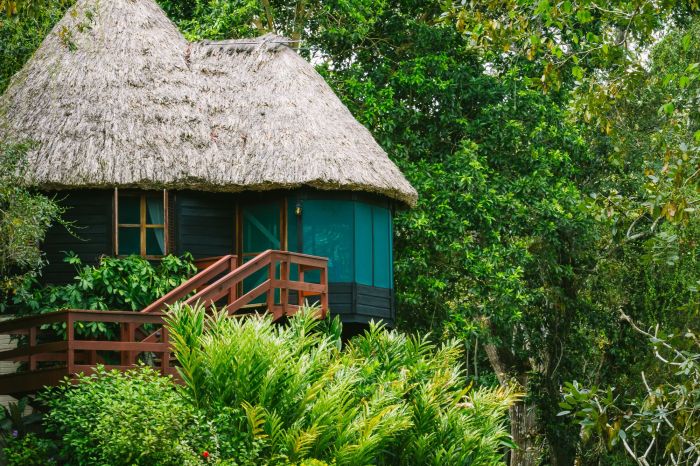
Eco-lodges prioritize sustainable practices to preserve the environment and minimize their ecological impact. These practices encompass energy efficiency, water conservation, and responsible waste management.
By implementing these practices, eco-lodges contribute to the conservation of natural resources, reduce their carbon footprint, and support the preservation of ecosystems and biodiversity in the surrounding areas.
Eco-lodges offer a unique and sustainable way to experience nature. These lodges are designed to minimize their environmental impact, using renewable energy sources, recycling programs, and sustainable building practices. They often offer educational programs and activities that focus on the local ecosystem and conservation efforts.
Whether you’re looking for a relaxing getaway or an adventure-filled vacation, eco-lodges offer a great way to connect with nature and support sustainable tourism. Learn more about eco-lodges and find one that’s perfect for your next trip.
Energy Efficiency, Eco-lodges
Eco-lodges employ various energy-efficient measures to reduce their energy consumption and minimize their reliance on fossil fuels. These measures include:
- Utilizing renewable energy sources such as solar and wind power
- Implementing energy-efficient lighting systems with LED bulbs and motion sensors
- Installing energy-efficient appliances and equipment
- Encouraging the use of natural ventilation and passive cooling techniques
Water Conservation
Eco-lodges implement water conservation techniques to reduce their water usage and protect water resources. These techniques include:
- Installing low-flow showerheads and faucets
- Implementing rainwater harvesting systems
- Using drought-tolerant plants in landscaping
- Educating guests on water conservation practices
Waste Management
Eco-lodges implement responsible waste management systems to minimize their environmental impact. These systems include:
- Implementing recycling and composting programs
- Using biodegradable and reusable materials
- Partnering with local waste management companies
- Educating guests on responsible waste disposal practices
Design and Architecture of Eco-Lodges
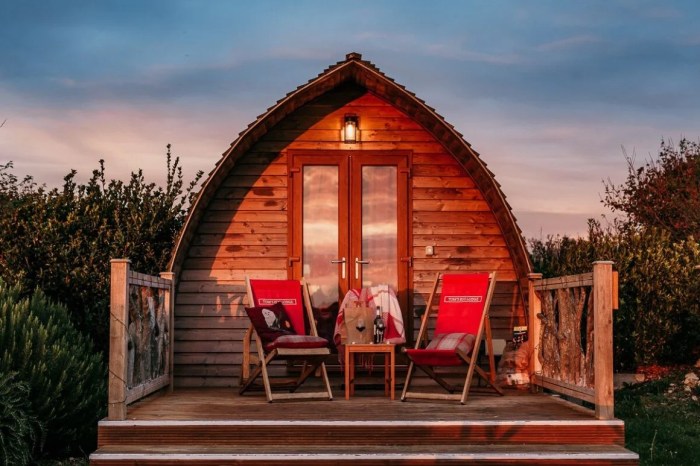
Eco-lodges embrace architectural principles and design elements that prioritize sustainability and enhance the guest experience. They incorporate natural materials, energy-efficient systems, and thoughtful layouts to minimize environmental impact while offering a unique and immersive connection with nature.
Eco-Friendly Materials
Eco-lodges utilize sustainable building materials that reduce their environmental footprint. These materials include:
– Recycled and reclaimed wood: Used for flooring, walls, and furniture, reclaimed wood reduces deforestation and waste.
– Bamboo: A fast-growing and renewable resource used for flooring, roofing, and furniture.
– Cork: A natural insulator harvested from cork oak trees, used for flooring, walls, and ceilings.
Energy Efficiency, Eco-lodges
Eco-lodges implement energy-saving measures to minimize their carbon emissions. These measures include:
– Passive solar design: Orienting buildings to maximize sunlight for heating and natural lighting.
– Energy-efficient appliances: Utilizing low-energy lighting, appliances, and heating/cooling systems.
– Renewable energy sources: Installing solar panels, wind turbines, or geothermal systems to generate clean energy.
Thoughtful Layout
Eco-lodges are designed to blend seamlessly with their surroundings, respecting the natural ecosystem. This includes:
– Minimal land disturbance: Constructing on existing trails and avoiding sensitive areas to preserve wildlife habitats.
– Native landscaping: Planting indigenous species to attract local wildlife and support biodiversity.
– Water conservation: Implementing rainwater harvesting systems and low-flow fixtures to reduce water consumption.
These architectural principles and design elements contribute to the sustainability of eco-lodges while enhancing the guest experience by providing comfortable and eco-conscious accommodations in natural settings.
Guest Experience in Eco-Lodges
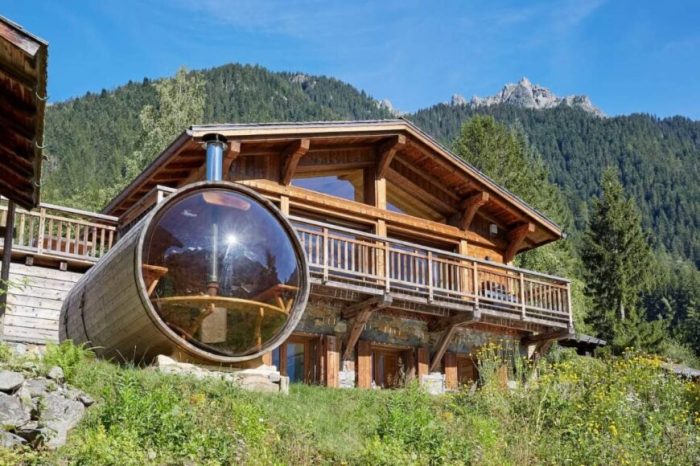
Eco-lodges provide a unique blend of nature immersion, sustainable practices, and memorable experiences for guests. They offer a profound connection to the natural environment while promoting responsible travel.
Eco-lodges often situate themselves in pristine locations, surrounded by diverse ecosystems and abundant wildlife. This setting allows guests to engage in immersive activities such as guided nature walks, wildlife viewing, and outdoor recreation. By participating in these activities, guests develop a deeper appreciation for the local flora and fauna, fostering a sense of environmental stewardship.
Activities and Amenities
Eco-lodges offer a range of activities and amenities tailored to enhance the guest experience and connect them with nature. These may include:
- Nature Trails and Guided Tours: Eco-lodges often feature well-maintained nature trails and guided tours led by knowledgeable naturalists. These trails provide guests with opportunities to explore the surrounding ecosystem, learn about local plant and animal species, and observe wildlife in their natural habitat.
- Wildlife Viewing: Many eco-lodges are located in areas with abundant wildlife. Guests can participate in organized wildlife viewing activities, such as birdwatching, game drives, and whale watching, to observe and learn about the local fauna.
- Outdoor Recreation: Eco-lodges often offer a variety of outdoor recreation activities, such as kayaking, canoeing, hiking, and mountain biking. These activities allow guests to explore the surrounding environment and connect with nature in an active and engaging way.
- Sustainable Dining: Eco-lodges typically emphasize sustainable dining practices, using locally sourced ingredients and organic produce. Meals are often prepared using traditional cooking methods and incorporate flavors inspired by the local culture.
- Cultural Immersion: Many eco-lodges offer opportunities for guests to interact with local communities and learn about their cultural heritage. This may include visits to nearby villages, traditional craft demonstrations, and storytelling sessions.
Environmental and Social Impact of Eco-Lodges
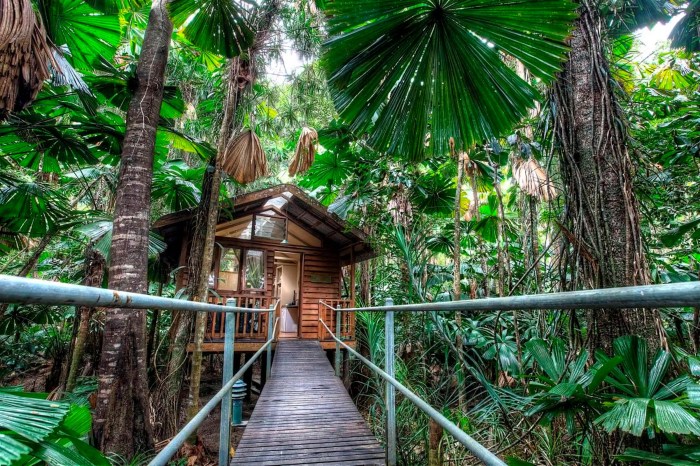
Eco-lodges have a profound impact on the environment and surrounding communities. They are designed to minimize their environmental footprint while maximizing their positive social impact.
Environmental Impact
Eco-lodges are committed to preserving and protecting the natural ecosystems in which they operate. They employ sustainable practices that reduce their impact on the environment, such as:
– Using renewable energy sources, such as solar and wind power
– Conserving water and implementing wastewater treatment systems
– Minimizing waste and using biodegradable materials
– Protecting wildlife and their habitats
– Educating guests about environmental conservation
By implementing these practices, eco-lodges help preserve the natural beauty and biodiversity of the areas they inhabit.
Social Impact
Eco-lodges also play a significant role in promoting social development. They create jobs for local communities, often providing training and skills development opportunities. This can lead to economic empowerment and improved living standards for the surrounding population.
In addition, eco-lodges often support local businesses and initiatives, such as cultural tourism and traditional crafts. They can also promote education and healthcare in the communities they operate in.
Examples of Impactful Eco-Lodges
Many eco-lodges worldwide have made a significant positive impact on their surroundings. For example:
– The Pacuare Lodge in Costa Rica has implemented a successful reforestation program, planting over 1 million trees in the area.
– The Singita Grumeti Reserves in Tanzania have partnered with local communities to establish conservation initiatives, protecting wildlife and creating sustainable livelihoods.
– The Lapa Rios Lodge in Costa Rica has received international recognition for its efforts in sustainable tourism, including the Rainforest Alliance Sustainable Tourism Standard and the National Geographic Unique Lodges of the World award.
These examples demonstrate the transformative power of eco-lodges in preserving the environment and empowering local communities.
Concluding Remarks: Eco-lodges

As the demand for responsible travel continues to rise, eco-lodges will undoubtedly remain at the forefront of this movement. They provide a harmonious balance between nature and comfort, creating lasting memories for travelers while fostering a deep appreciation for the planet’s fragile ecosystems.
Answers to Common Questions
What sets eco-lodges apart from traditional accommodations?
Eco-lodges prioritize sustainability by implementing eco-friendly practices, such as energy efficiency, water conservation, and waste management. They also support local communities and promote responsible travel.
What are the benefits of staying in an eco-lodge?
Eco-lodges offer a unique opportunity to connect with nature, support local economies, and reduce your environmental footprint while enjoying a comfortable and immersive travel experience.
How can I find eco-friendly lodges in my desired destination?
There are various online platforms and organizations that specialize in listing and certifying eco-lodges worldwide. Look for recognized eco-labels or certifications to ensure the lodge’s commitment to sustainability.